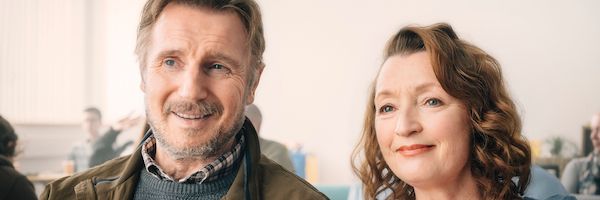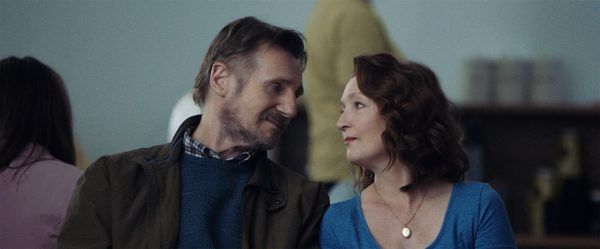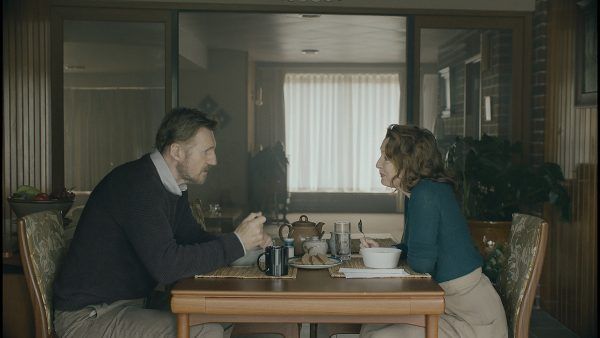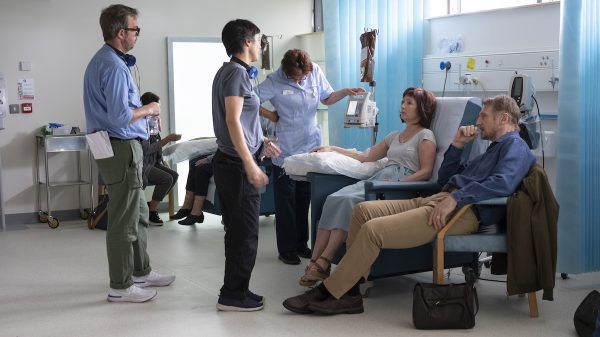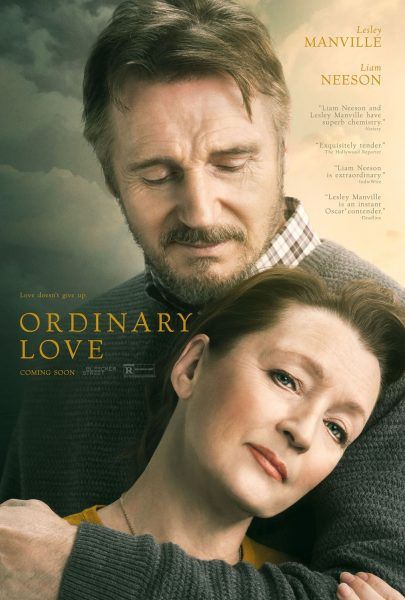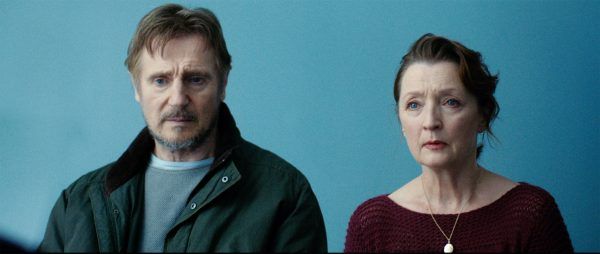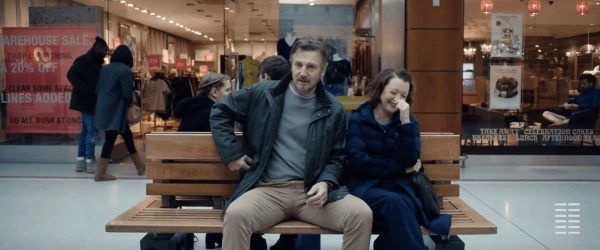2020 has only just begun, but directors Lisa Barros D'Sa and Glenn Leyburn (Good Vibrations) have already delivered my favorite film of the year. Ordinary Love, playing in theaters now, tells the story of a perfectly ordinary couple (Liam Neeson and Lesley Manville) undergoing extraordinary circumstances -- a diagnosis of breast cancer. The two actors, delivering career-best work, struggle with the truths of the disease while still finding the time to celebrate the joys of their easy love. It's a remarkable, sensitive, touching piece of film that will stick with you for some time after, and I was beyond thrilled to chat with Barros D'Sa and Leyburn about how they put it all together.
During this phone interview with Collider, the directors talked about the real-life inspiration for the story, the ease at which Neeson and Manville crafted their lived-in intimacy, the way they direct as a duo, the necessity of paring the film down to its essentials, and what they hope folks undergoing similar circumstances will walk away feeling.
Collider: I would love to start from the beginning of this film's journey. How did you come across Owen McCafferty's script? And were you familiar with his work as a playwright?
LISA BARROS D’SA: We were familiar with his work, and when we met, the project wasn't a script yet. We had been, Glenn and I and David Holmes, with whom we have a production company, he's a long term collaborator of ours, best known for his music soundtracks, but also a producer on this film. David and Owen have been friends for a long time. They grew up in the same parts of Belfast. We all were really familiar with Owen's work as a playwright, a brilliant playwright, and we'd been talking about developing something together for quite some time. His story is based on what happened in Owen's own life, when his wife Peggy was diagnosed with breast cancer. There are many fictional elements to the story, but that's where it came from. And it was really David who had suggested to Owen that he write this as his first screenplay. I think Owen was a little reluctant at first because it's a tough subject matter to go back to. But David is very persuasive, and I think he felt, as we did... Owen began to feel that this is subject matter that could produce something really powerful. And so we got involved at that stage. And we were really excited to see what would emerge because it's very intimate material. We just felt it could emerge as a really powerful piece, and that we were absolutely delighted when we even got to the point of reading the first drafts. There is a story about cancer in here, but what this really was, was an incredible and unique love story, a story about marriage, a love story, one that we just felt hadn't been explored in this way, and it was wonderful.
Dealing with a piece of material that is maybe atypically intimate or personal, were there measures taken either in the filming process or speaking with Owen on how to render it as sensitively as possible? Or did you just kind of put your heads down and tell the story that needed to be told?
GLENN LEYBURN: We had loads of discussions with Owen, and also Peggy, his wife. We talked with Peggy a lot, and one of the things that we thought that we liked about the project along with Owen's screenplay was that it wasn't sentimental and it wasn't sensationalized. We were all very keen that the film stayed that way, and sometimes there can be outside pressures to kind of picture them as highly dramatic or melodramatic direction. And that was one of the things that we all felt that we had to hold our nerve on and not do. Because we felt that these every day moments were worthy of the big screen as much as any kind of sensationalized version of those. We think that there is magnificence in those moments as much as anything. So, we did, we talked a lot. And then, with regard to the medical side of things, there was a lot of research. Lisa's from a medical family. Her father was a surgeon, and her mother's an anesthetist, and her sister is a consultant in palliative care. So through family connections, and also through wider connections and hospitals in Northern Ireland, it was well researched so that the material was treated with the precision that it deserved.
BARROS D’SA: There's so many people who go through this kind of story every day. So many of us have a connection with this story. It's not hard to meet friends, relatives. So we really wanted to honor the truth of that experience as much as we could, and that research was a huge part of it. And we even have real medical professionals on the screen who really generously gave up their time to come and help us do those scenes. So in some of the scenes where Lesley is going through different treatments and tests, it's a real mammographer, chemo nurse, radiologist, all performing as they would, as closely as possible as they would with a real patient. So, it helped us feel that we were telling the story authentically and I think it helped Lesley as well because she could do what a patient does in those circumstances, which is to give yourself over into the hands of the people who know what they're doing. And even if you don't know what's happening, as much as people try to explain these procedures to you, it's always quite bewildering. So she was able to give herself into the hands of the professionals. And I think we all felt that that helped each of us in our roles just build a bit more authenticity into the piece.
I think that authenticity really shines through. As directors, either with non-professional real people as in the case of these medical professionals or with two very well-known screen actors, how do you two approach directing actors? Does one of you take one aspect and the other another, or is it more collaborative?
BARROS D’SA: I work more with the actors.
LEYBURN: Yeah, Lisa works much more closely with the actors. I'm from a design background. I came into the film business through working on music design and then doing pop videos and that sort of stuff. So that's how I came into the industry. So I tend to work more closely with camera and production design and all those aspects and Lisa works with the actors. But, in actual fact, those things have to work together, of course. So the truth is that we discuss every aspect between ourselves, and we both have as much impact on each other's, I suppose, speciality. But, on the day when we're shooting, we don't really agree that it should be... I know some directing teams do that kind of tag team with actors. We don't believe that's the way we want to approach it.
Were there ever any moments when, let's say the two of you sort of crossed into each other's kind of expertise?
LEYBURN: Always. To me, that's the thing. We spend weeks, months, if not years talking about these projects and it's really, really important that we discuss every aspect of a performance because Lisa has as much input in the visual style as I do and vice versa. And after all the talking and all the preparation that we do, which is hundreds if not thousands of hours, at the end of that we have a singular vision for the film. We know what tonality, what we're striving for so that allows it then, when we're on set to do run in opposite directions when we say cut and I talk to camera, Lisa talks to actors. But even on set, we're discussing everything in the moment, either looking at the performance side of the camera or on the monitor and discussing every aspect of it. It just appears more separate on that. We've been working together long before we'd ever collaborated with Owen. We collaborated on other projects, so there's a mutual trust, I think, between us.
BARROS D’SA: Sure. And as Glenn said, it all comes from that single voice that we have. The single voice for the particular film that we have built together over the course of time in preparation.
How did the two of you come to cast and work with Liam and Lesley on this?
BARROS D’SA: We've been big fans of both actors for a while. So, I should just say what a privilege we felt it was to be able to work with them both. And not only that, but to bring them together on screen for the first time. We'd been talking to Liam in the past about another project, so we had got to know him a little and we just felt that there was material in this that he would be really interested in. And when we read the first draft, we just heard his voice in it. So, we took a chance and we sent it to him early on. And fortunately he agreed and loved the writing. So he was on board first. And Lesley-- I mean, Lesley is just the most extraordinary actor too, one of the greats. And so we all felt there was something that the two actors share. They're so convincing, so believable in everything that they do, that there was a sense of humor that it felt like they would share. We knew Liam was a big fan of Lesley as well. So we were absolutely thrilled when she agreed to do it as well. And as soon as we got them together, we could see that this onscreen chemistry was going to work. So basically, they're both very witty people, very generous people, very kind, generous actors. They really create a lovely space between them. And there was a real generosity with how they worked on set. So being on set with them was just a joyful experience every day. It was such a lovely atmosphere that I think enables everyone to feel safe enough to do their best work.
My understanding was that they had not met each other until filming began. Is that right?
BARROS D’SA: Not quite, but not far off. They didn't meet until they they both agreed to the project. They were both very keen to work together. They've got huge respect for each other as actors, but they hadn't ever met. So we, a short time before we started filming, Lesley was starring in Long Day's Journey Into Night on stage in New York. Liam lived in New York. So we saw it together, and they got together and they had a dinner one night, before we arrived. That was the first time they met. Liam went to see Lesley on stage. And I think immediately they bonded. And the next day or two days afterwards, we all got together, sat down, and had them reading the script. And, as I said, they had a shared sense of humor, various acquaintances in common. It wasn't very long before they started to feel like old friends.
Oh, that's so lovely to hear. They definitely bring a sense of intimacy, of comfort with each other. They feel like they've known each other forever. And I'm curious if there was a process to get to that place of emotional intimacy, whether it be through maybe crafting backstories for those characters, or was it just kind of showing up and delivering the material?
BARROS D’SA: The time that we did spend together, the couple of days that we had in New York and then before shooting, rather than really rehearsing scenes in detail, the work was about just the emotional journeys of the characters and how they got to this place, what it was like for the two of them through this process. And of course then you throw in... You have conversations about who the characters are, what their backgrounds are, their backstory, as you say. And all of that really informs the choices. And that's important stuff because that comes into the kind of home that they live in, to your production design, the kind of clothes that they wear. So wardrobe choices.
LEYBURN: Like the car they drive. Yeah.
BARROS D’SA: All of that. So those were conversations that we were all having, because those are important parts of building the characters too. And so yes, Lesley and Liam were very involved in those conversations. And so that was a process of building. But also, I mean, the thing that you really want to build is trust and familiarity with each other, so that whenever we all got to set, everybody would feel relaxed enough to do great work. Because there's some really... There is intimate and very emotional material in this. And if people don't feel like they're in a supportive environment, it's hard for them to be vulnerable. So what we hope to do is to create that kind of environment that would allow them to do their very best work. I mean, what they have to create in this is not just their own characters, but, as you say, this sort of entity, this invisible entity of this 30 year marriage. And you know, it was just a testament to how brilliant they both are as actors, that they are able to bring this to life without a great deal of preparation, just right there in the room.
I love the way you phrase that, the invisible entity. I think this film has a lot of subtextual... everyone in the room knows exactly what's going on, even though we're not saying it explicitly. And I think maybe the largest dramatic moment of that is that we never really find out the past trauma that they experience with their child dying. We never really find out the circumstances of that. Were there ever any discussions of how much we need to reveal versus how much can stay subtext?
BARROS D’SA: Lots of discussions. Yeah, absolutely. I mean we loved the way that that was dealt with in the script with a very light hand. We wanted this story to be within these characters' points of view. We just... you can trust an audience's intelligence much more, I think, than certain films allow. We only wanted to give as much information as we needed for the audience to be able to experience the story emotionally as much... in the way that we wanted them to. But it's a very fine thing to calibrate. So, there were a lot of discussions in the edit about how many frames do we linger on this photograph. At what point do we insert a little bit of information about this story, and it's enough to sort of get across what we want to say without things being confusing, but not too much that it feels too sentimental or that it weighs the story in the wrong direction.
LEYBURN: I guess, for this film, we find that in every aspect of it, we find that pulling things back or stripping things back to their essential elements is really important. It felt like the more that we did that, the more power the story had. And that follows through from production design to music to performance to how we cut or how long we held on things. Everything. The more we honed it, it felt, to us, the more power that it had, and the further away it was from that overly sentimental or melodramatic beats we were trying to avoid.
I'm glad you brought up the usage of editing to convey that stripping down to the essentials. I really enjoyed how tightly paced the film was. But I am wondering, were there much longer cuts you were playing with? And were there any scenes or moments that couldn't make the final cut but that you were very proud of or loved?
LEYBURN: Yeah, I mean I think you always have that. Things that end up being cut that you loved. And yeah, we certainly... When you go in and you have an assembly of a film, it can be quite a bit longer, it could be an hour longer. And that's the process of honing, and honing again, finding those essential moments. We've worked with a really great editor called Nick Emerson, who has actually worked with us right from our very first short film. Our first short film was his first drama that he ever cut. So, we've worked together for years and come through the business together for years, and that relationship is incredibly important to us. And I think Nick and ourselves, we really feel that film has a lot in common with music, the composition of music. And the musicality of a cut is very, very important to us. So that we recognize... We know that building and dropping and building again, those things are something that we really try to explore during a cut. And, especially in a film like this, I think it's incredibly important.
BARROS D’SA: Yes. I think one of the challenges in this, because it's a film that really... Because there's just a poetry in drawing out this magnificence and the beauty of these everyday moments between two people, but at the same time we also want to propel the audience through it. You don't want the film to feel too still or to lose energy. So there's also the need to just create a propulsion to bring the audience, to draw the audience through to the conclusion. And that's very much about the craft of editing.
I'm glad you brought up the musicality of it. I was really struck both by the needle drops in the film and the score. And you've mentioned that you work very closely with David Holmes, who is a co-composer on the film. I personally am mostly familiar with his work on, like, Steven Soderbergh's films on his more kind of upbeat, funk-driven sort of work. I'm just curious what the conversation was like with him insofar as the musical soundscape of the film.
LEYBURN: David, Lisa and myself have worked together for many, many years. And, as you said, he's well-known for things like Ocean's Eleven. And David has a really, really brilliant tonality of films, and he has a real instinct for that. And his other films that he's done, for example, he worked on Steve McQueen's Hunger. I believe in that particular film he just used one musical instrument. And, again, it's about paring back and being very precise and concise. Talking to David, we all felt that it was about not asking for emotion from the audience with the score. It wasn't about putting the thumb on the scales for emotion, it was about finding the rhythms of life and those kind of moments that underscore these everyday moments without asking for that emotion.
I wanted to double back to your work with actors, maybe drawing a line between your other films. I think especially from an American audience perspective, we kind of have an image of Liam Neeson through his action films. We have an image of Lesley through Phantom Thread. On your film Cherrybomb, we have an image of Rupert Grint as Ron Weasley. When you work with these actors on these different takes of their persona, do you have a "We're going to tweak or twist your image" conversation, or is it mostly just about the material?
BARROS D’SA: I think it all just comes from the material. I think as far as Liam is concerned, we all have vividly in our minds the really beautiful dramatic emotional performances that he has given in some brilliant films. And Lesley as well. Lesley is an actress of incredible range. We first came to be aware of her, as most people did, through her brilliant work in Mike Leigh's movies. She works across theater, she's done all of the great theater roles, as well as some beautiful TV comedy work in a show called Mum recently. So essentially we just knew that Lesley could do anything. (Laughter) And Liam too, we just understood that he has this place that... You just, you always believe in him with such honesty there in what he does. And it was just the sense that there was something in the two of them that might really gel together. So, I don't think we would set out... I think what we are excited about in an actor is, it's feeling like these are people who will really chime with the material and the themes of the piece and the terminology of it. That was what we really found with these two. And I can't imagine any other actors who could have done it with the brilliance that these two achieved.
My final question for you two: If there is a couple going through a similar experience of the couple in this film that watches this film, what do you hope that they walk away thinking and feeling?
BARROS D’SA: One of the things that we were really aware of in making this film is that there are so many people who are going through this story every single day. One in two people, they say, in the UK can be diagnosed with some form of cancer at some time. And, outside of that, we all come up against our own versions of the potential for loss and grief at some point. I think what we hope to do with telling this story in as authentic a way as we possibly could manage was just to respect that reality that exists for a lot of people. And I think what the portrayals of these characters do is really celebrate the power of human connection to get us through the toughest time.
Ordinary Love is in theaters now.

